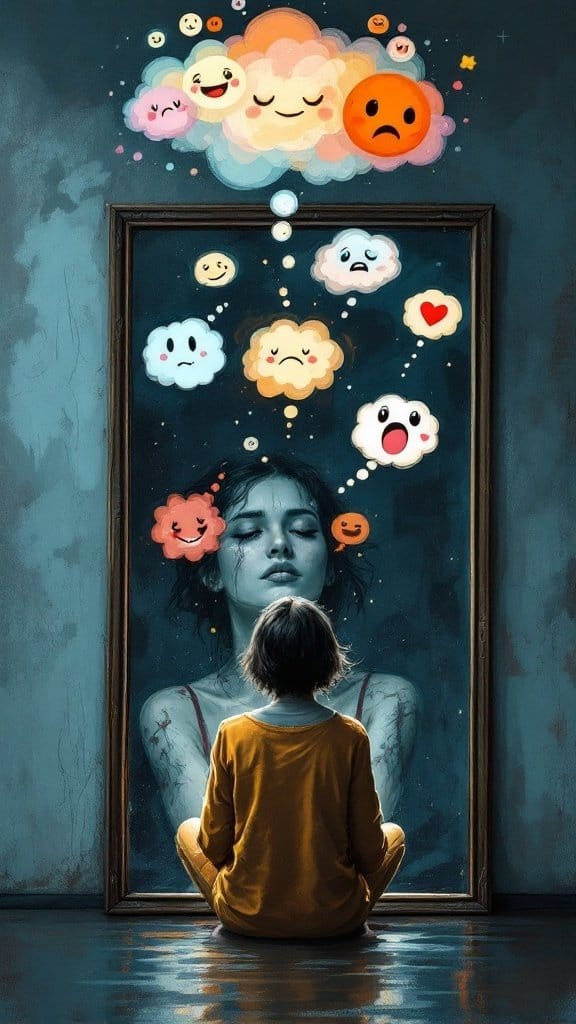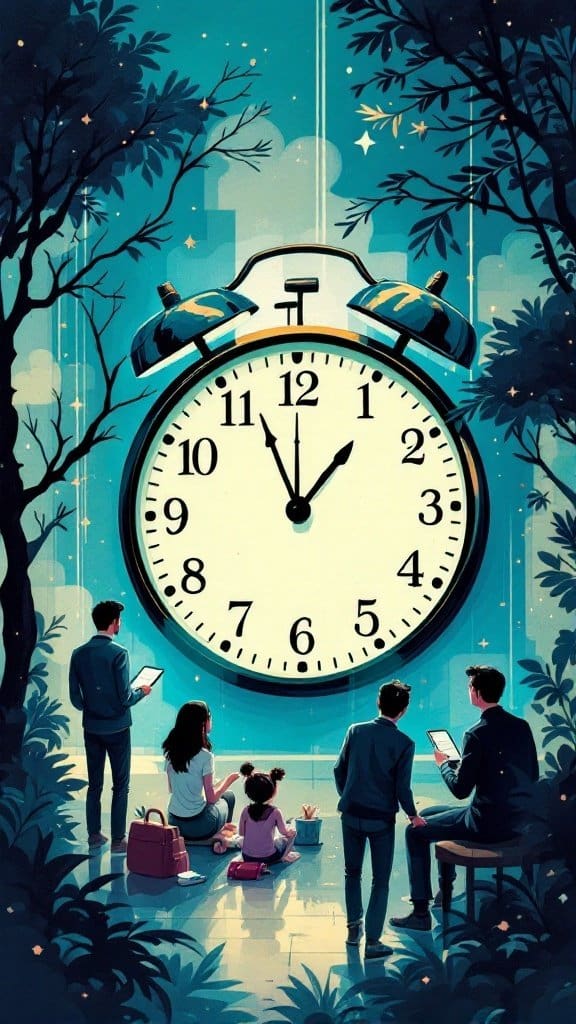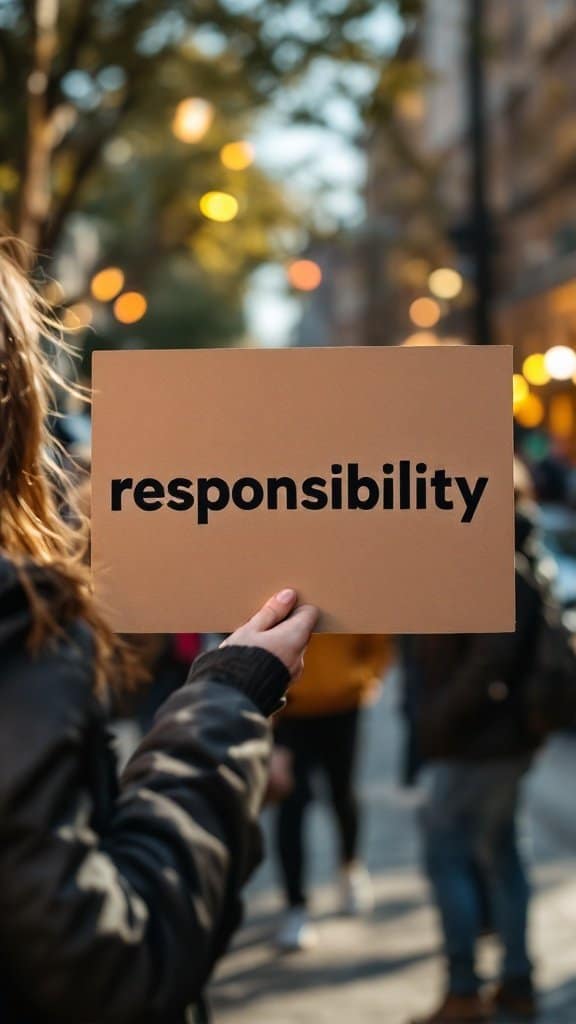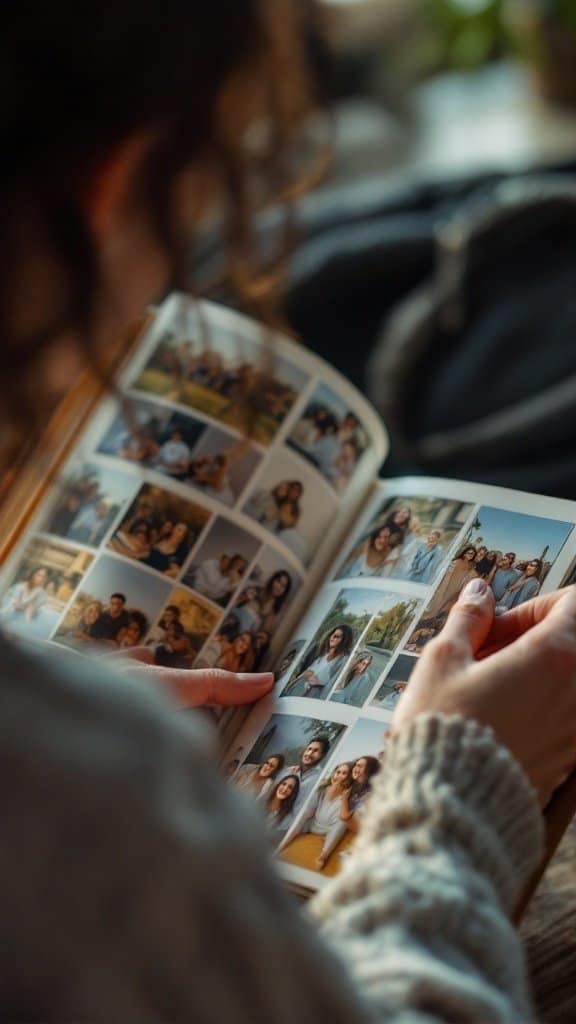Friend drama can be a real hassle, but it’s something we all go through from time to time. Navigating the tricky waters of friendships requires a bit of honesty and some practical tips. Here are 15 straightforward ways to tackle those messy situations and come out stronger on the other side.
Recognizing Your Own Emotions

When it comes to friend drama, it’s crucial to take a moment to recognize your own emotions. The image illustrates this beautifully. A child sits in front of a mirror, reflecting on different feelings symbolized by colorful clouds. Some are happy and bright, while others are sad or confused. This visual representation captures the complexity of our emotions.
Understanding how you feel is the first step in dealing with any conflict. Do you feel hurt, angry, or perhaps misunderstood? Acknowledging these emotions helps you articulate them better when discussing issues with friends. Just like the clouds in the image, emotions can be varied and sometimes overwhelming.
It’s okay to take a moment, just like the child in the picture. Sit quietly, think about your feelings, and let them surface. This self-reflection will create a clearer path to understanding the dynamics of your friendship. Emotions are a natural part of human relationships, and recognizing them allows you to navigate friend drama more effectively.
Choosing the Right Time to Talk

When it comes to dealing with friend drama, timing is everything. Think about the image above, featuring a giant clock surrounded by a serene setting. It perfectly illustrates the importance of selecting the right moment to have those tough conversations.
First off, avoid springing a serious talk on your friend when they’re busy or stressed. Just like the peaceful atmosphere in the image, you want to create a calm environment. Choose a time when both of you can focus on the discussion without distractions.
Also, consider their mood. If they’ve had a rough day, it might be better to wait. Friends need to feel at ease before diving into the nitty-gritty. Just like the figures in the image are engaged and present, aim for a setting that encourages open dialogue.
Lastly, don’t underestimate the power of body language and facial expressions. The characters in the illustration appear connected and attentive, which is what you want in your conversation. Choose a time when you both can be fully present, and your honesty will surely shine through.
Listening Without Judgment

When it comes to handling friend drama, one of the simplest yet most impactful things you can do is listen without judgment. This approach allows your friend to express their feelings openly, creating a safe space for honest communication.
The image captures two friends sitting on the grass, deep in conversation. Surrounded by lush greenery, they seem engaged and focused on each other. This setting perfectly illustrates the idea of having a heart-to-heart chat, away from distractions.
Listening without judgment means putting aside your own opinions and feelings for a moment. Instead of jumping to conclusions or offering unsolicited advice, just let your friend share their story. Remind them that you’re there to support them, not to critique their choices.
Encouraging your friend to speak freely can help you both understand the root of the drama. This way, you can offer better support and help them navigate their feelings. Just like in the image, sometimes all it takes is a peaceful environment and an open ear to make a real difference in a friend’s life.
Avoiding Gossip and Rumors

Friend drama often arises from misunderstandings and gossip. When you see a group of friends chatting, like the ones in the image, it’s easy to assume that they’re discussing someone else. Avoiding gossip is essential for maintaining healthy friendships.
First, focus on open communication. If something bothers you, talk to your friend directly instead of sharing your feelings with others. This approach can prevent rumors from spreading and keep your relationships strong.
Secondly, set boundaries when discussing others. If a conversation shifts to gossip, steer it back to positive topics. This not only keeps the vibe friendly but also shows that you value respect over drama.
Lastly, be mindful of who you’re sharing information with. Trust is crucial in friendships, and sharing sensitive details can lead to misunderstandings. Keep your circle tight and choose wisely whom you confide in.
Communicating Openly and Honestly

In dealing with friend drama, open communication is key. Just like the two friends in the image, sitting together with coffee, it’s important to create a comfortable space for conversation. When you’re facing conflict, getting together in a relaxed environment can help ease tension.
Look at how they’re engaged with each other. This shows that they value what the other person has to say. In your conversations, make sure to listen as much as you speak. Acknowledging each other’s feelings is vital.
Being honest doesn’t mean being harsh. You can express yourself while still being kind. It’s all about sharing your feelings without putting the other person on the defensive. Use “I” statements to express how you feel instead of placing blame.
Lastly, it’s important to keep the lines of communication open. Just because one conversation goes well doesn’t mean the issue is resolved forever. Check in with each other regularly. This helps maintain trust and makes it easier to tackle any future misunderstandings.
Practicing Empathy

When it comes to dealing with friend drama, practicing empathy is key. The image of two friends sitting together, gazing out of a window, perfectly captures this idea. It shows a moment of connection and understanding, an essential part of navigating emotional ups and downs.
Feeling what your friend feels can create a safe space where they can share their thoughts. Just like the person in the image, who is gently providing comfort, sometimes all you need to do is be present. Listening to their concerns without judgment can make a huge difference.
Empathy not only helps your friend feel supported but also gives you a deeper understanding of their perspective. This can lead to more meaningful conversations and solutions that work for both of you. Remember, showing that you care can go a long way in easing tension and resolving misunderstandings.
Consider how a simple gesture, like a reassuring hand on their shoulder, can communicate your support. This can remind your friend that they are not alone in their struggles. By practicing empathy, you both can strengthen your friendship and navigate drama with a sense of togetherness and care.
Setting Boundaries with Friends

When it comes to friend drama, setting boundaries is key. This image of two individuals standing apart with a visible line in the sand symbolizes the importance of defining personal space and limits. Just like that line, boundaries help you maintain a healthy relationship.
Think of boundaries as guidelines that tell your friends what is okay and what isn’t. This can be about topics you’re comfortable discussing or how much time you need for yourself. It’s all about respect and understanding.
If you feel overwhelmed or stressed, it’s okay to say, ‘I need some time for myself.’ This isn’t selfish; it’s necessary for your mental health. Clear communication can prevent misunderstandings and help your friends understand where you stand.
Also, remember that boundaries can change. What works for you now might not be the same down the line. It’s important to check in with yourself and your friends regularly. Keeping that line flexible allows for growth in your friendships.
Finding Common Ground

When it comes to resolving friend drama, finding common ground is key. Just like putting together a puzzle, it requires patience, understanding, and collaboration. In the image, we see two friends engaged in a playful puzzle activity, highlighting the importance of teamwork in overcoming challenges.
Take a moment to think about shared interests or experiences. Whether it’s a favorite hobby or a fun memory, these connections can help bridge gaps. Just like the friends working together on the puzzle pieces, you can piece together solutions to any disagreement by focusing on what you both enjoy.
Don’t shy away from discussing feelings or perspectives. Open communication is vital. It can feel daunting, but remember that you both want to resolve the issue. Maybe you can create a casual setting, like a game night, to ease into deeper conversations. Finding something light-hearted, like a puzzle, can set the stage for honest dialogue.
Lastly, remember to keep the conversation constructive. Instead of pointing fingers, focus on how to move forward. Celebrate small victories, just like completing sections of the puzzle together. By nurturing your friendship and working on issues as a team, you not only find common ground but strengthen your bond.
Understanding Different Perspectives

Friend drama can often feel overwhelming, but understanding different perspectives can help clear the air. The image shows two friends standing in the middle of a quiet street, both holding cameras and looking towards the same distant landmark. This simple moment reflects how two individuals can share a space yet see things differently.
Just like these friends, everyone has their own lens through which they view situations. When conflicts arise, it’s crucial to take a step back and consider what your friends might be experiencing. Are they feeling hurt, misunderstood, or even defensive? Acknowledging their feelings can pave the way for better conversations.
In the same way the two friends are focused on something in the distance, you should focus on the bigger picture. Start by asking questions and genuinely listening. This practice can help you bridge gaps and find common ground. Remember, seeing things from another person’s viewpoint can lead to a more harmonious friendship.
Admitting When You’re Wrong

In any friendship, there will be bumps along the way. Sometimes, we say things we don’t mean or act in ways that hurt our friends. The key to moving past these moments is admitting when you’re wrong.
Look at the image: two friends chatting in a beautiful park, surrounded by colorful autumn leaves. Their expressions show a mix of seriousness and openness, which is perfect when discussing tough topics. It’s a reminder that having these hard conversations can happen anywhere, even in a peaceful setting.
Admitting you’re wrong isn’t always easy. It takes courage to step back and acknowledge your mistakes. But doing so can strengthen your bond. When you openly accept your faults, it shows your friend that you value the relationship more than your pride.
Start by being honest about what happened. Share how you feel and why you think you might have hurt them. This kind of transparency can clear up misunderstandings and pave the way for healing.
Remember, everyone messes up sometimes. It’s a part of being human. What matters is that you’re willing to own it. If you can face your mistakes head-on, it not only helps mend fences but also builds trust. And that trust? It’s the foundation of any strong friendship.
Seeking Mediation

When friend drama gets intense, sometimes you need a neutral party to help smooth things over. This is where mediation comes into play. In the image, we see a friendly gathering, likely discussing some issues while maintaining a positive atmosphere. The three people seem engaged, which is key for effective mediation.
Mediation is all about creating a safe space for open communication. It’s important that everyone feels heard and respected. This setting, surrounded by plants and natural light, adds to the calming vibe, making it easier for friends to express their feelings.
Choosing the right mediator can make a big difference. It could be a trusted mutual friend or even a professional if needed. The goal is to guide the conversation without taking sides. Everyone wants resolution, not just to air grievances.
Remember, the mediator should keep things friendly and focused. They help facilitate the discussion so each person can share their perspective without feeling attacked. This creates an opportunity for understanding and healing.
Knowing When to Step Away

Friend drama can really take a toll on our mental space. Sometimes, it’s best to recognize when the situation is getting too heavy. The image of four friends standing apart, each in their own world, represents that moment of reflection. You can sense the distance, and maybe even the tension. This visual serves as a reminder that stepping away is sometimes necessary for our own peace of mind.
It’s okay to take a break when things get too intense. Often, we feel like we have to fix everything, but that’s not always possible. When you notice your energy is being drained or you’re feeling overwhelmed, it might be time to step back. You don’t have to be in the middle of every conflict or drama.
Think about your own needs. Your well-being should come first. If you find yourself constantly stressed or upset due to drama, it’s a sign you need to take some space. Whether that means leaving a group chat, hanging out less, or just taking time for yourself, listen to those feelings.
In the end, stepping away doesn’t mean you don’t care. It’s about preserving your own mental health. Just like the friends in the picture, sometimes, walking away is the best way to find clarity and peace.
Taking Responsibility for Your Actions

When dealing with friend drama, taking responsibility is key. It’s about owning up to your actions and understanding how they affect others. The image shows someone holding a sign that boldly states ‘responsibility.’ This simple yet powerful message serves as a reminder that accountability is essential in maintaining healthy friendships.
We all make mistakes. It’s part of being human. However, the real growth happens when we acknowledge those mistakes. By taking responsibility, you show your friends that you value them and are willing to make things right. This approach can help clear the air and rebuild trust.
Start by reflecting on your role in any conflict. Ask yourself how your actions may have contributed to the situation. Once you identify your part, approach your friend with honesty. A sincere apology can go a long way towards healing any rifts.
Moreover, taking responsibility isn’t just about saying sorry. It’s also about making a commitment to change. Think about what steps you can take to prevent similar issues in the future. This proactive approach can strengthen your friendship and show your dedication to making it better.
Celebrating Resolved Conflicts

Friendship isn’t always smooth sailing. Sometimes, conflicts arise, leading to tension and disagreements. But when those issues are resolved, it’s worth celebrating! The image captures the joy of friends reuniting after overcoming their differences. You can almost feel the laughter and relief in the air.
In the picture, we see three friends sharing a moment, clinking their glasses as they toast to their friendship. This simple act is a powerful reminder of the connections we cherish. It shows that after the storm, there’s a calm, filled with understanding and support. Celebrating these moments is essential for strengthening bonds.
When conflicts are resolved, it opens the door to deeper conversations and stronger relationships. It’s a chance to reflect on what brought you together in the first place. So, next time you overcome a hurdle with your friends, take a moment to celebrate! Whether it’s a toast or a fun outing, acknowledge the effort it took to get there.
Resolving conflicts isn’t just about moving on; it’s about creating memories that enhance your friendship. So grab your friends, share a toast, and remember: every resolved conflict is a step toward a stronger relationship.
Reflecting on the Friendship

Looking through old photos can really bring back memories. Each snapshot captures a moment that tells a story about your friendship. It’s easy to get lost in the laughter and fun you shared. The image shows someone flipping through a photo album, highlighting the joy and connections that those images represent. When dealing with friend drama, taking a moment to reflect on your friendship can help you gain perspective. Remembering the good times can remind you why the friendship is important. It’s like a gentle nudge to look past the current issues and focus on the bond that brought you together in the first place. Maybe it was that road trip or the late-night chats that made you click. These memories serve as a reminder that every friendship has its ups and downs, but the foundation is often built on shared experiences and laughter. So, when tensions rise, take a moment to reflect. Pull out that photo album, and let those memories guide your next steps. It might just help you find a way through the drama.
This post may contain affiliate links which means I may receive a commission for purchases made through links. I will only recommend products that I have personally used! Learn more on my Private Policy page.